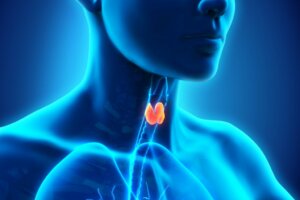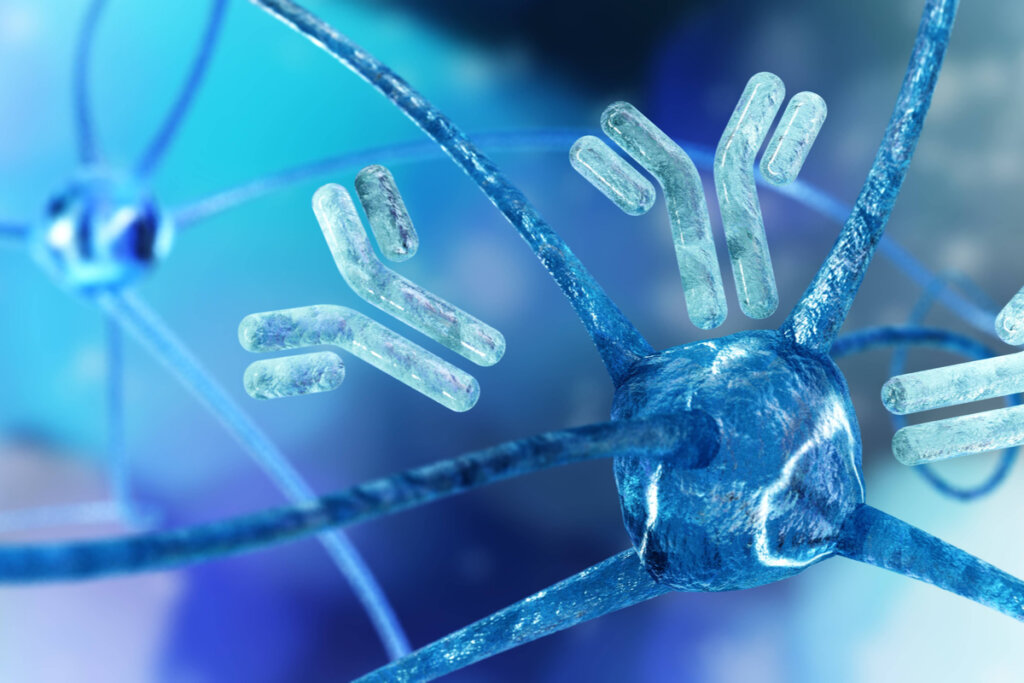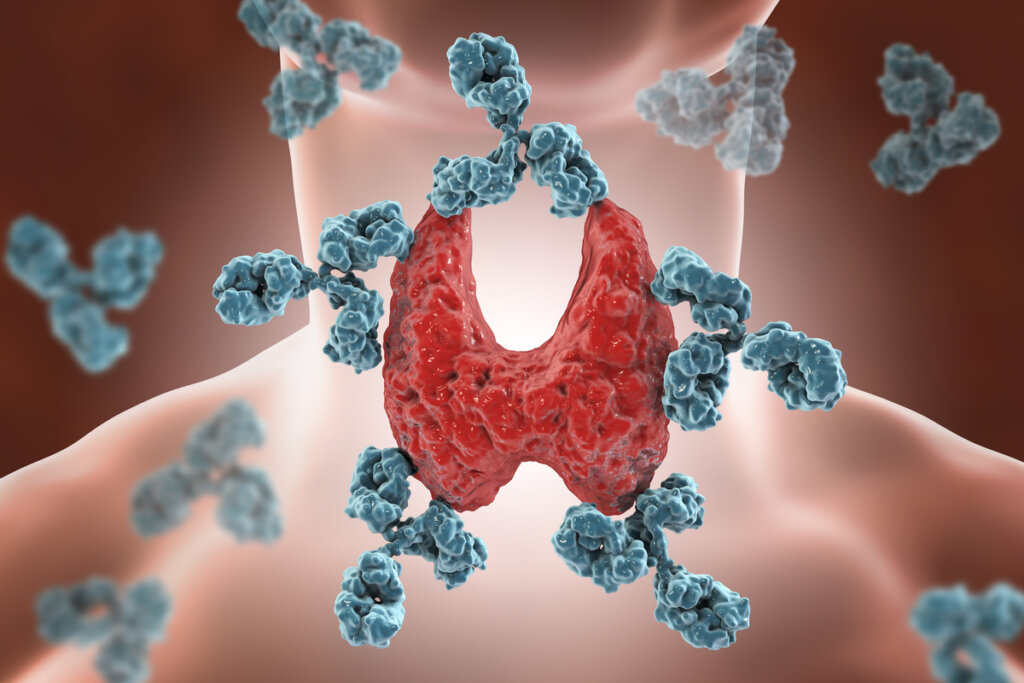Psychoneuroimmunology and Thyroid Hormones: How Are They Related?

The relationship between the brain, the immune system, the endocrine system, and related diseases is what psychoneuroimmunology or psychoneuroendocrinoimmunology (PNI) studies. In fact, one of the issues addressed by this scientific discipline is the possible relationship between psychological factors and autoimmune diseases, In this article, we’re talking specifically about thyroid diseases of autoimmune origin.
Modifying certain psychological aspects can improve the progression or prognosis of autoimmune diseases, such as Hashimoto’s disease. In this article, we examine how personality factors, stress, and mental health in general, may be related to thyroid diseases.

Psychoneuroimmunology
Psychoneuroimmunology is a scientific discipline that studies the relationship between the immune system and certain diseases. The term was first coined by the psychologist Robert Ader and the immunologist Nicholas Cohen, in 1975. They both managed to demonstrate the relationship between the nervous and immune systems. In other words, they demonstrated how emotions can affect our immune system and vice versa.
One of the objectives of psychoneuroimmunology is to study from a holistic and multidisciplinary approach the origin of certain diseases, especially chronic diseases of autoimmune origin.
This discipline is based on the fact that emotions, stress, anxiety, and depression cause changes in both the hormonal and immune systems. The gut microbiota also has a central role in psychoneuroimmunology. That’s because autoimmune diseases are related to an imbalance in the microbiota.
PNI is also in charge of studying the role of personality traits in the onset and course of autoimmune diseases, the role of neurotransmitters and neuropeptides in immunity, and the comorbidity between immune disorders and mental illnesses.
Thyroid, thyroid hormones, and thyroid diseases of autoimmune origin
The thyroid is a butterfly-shaped gland whose function is to produce the necessary amount of thyroid hormones to satisfy the demand of the peripheral tissues. The thyroid is important for the regulation of body temperature. In fact, it’s often called ‘the body’s thermostat’.
We tend to only associate the thyroid with changes in body weight. However, in reality, its function is far more complex. As a matter of fact, the thyroid plays a role in almost every organ and system in the body. For instance:
- It produces the hormones necessary for proper growth and development. These are essential for the development of the nervous system.
- It regulates many metabolic processes.
- It’s involved in the synthesis and degradation of proteins and fats.
- It’s involved in the maintenance of tissues in the liver, heart, and nervous system.
How does the thyroid work?
The hypothalamus secretes thyrotropin-releasing hormone (TRH), which stimulates the pituitary gland to produce thyroid-stimulating hormone (TSH or thyrotropin).
TSH stimulates the thyroid to produce thyroid hormones T3 (triiodothyronine) and T4 (thyroxine). The pituitary gland slows or speeds up the release of TSH depending on the amount of thyroid hormone in the blood.
Thyroid disorders can be divided into diseases that result in excess production of thyroid hormone (hyperthyroidism) and those that result in a deficiency in the production of thyroid hormone (hypothyroidism).
The deficit or excess production of thyroid hormone can be accompanied by the presence of antibodies (either anti-thyroglobulin antibodies- Tg- or anti-thyroid peroxidase antibodies- TPO-). This suggests that the cause of thyroid disease is an autoimmune disorder, such as Graves’ or Hashimoto’s disease. In effect, these are diseases caused by our antibodies “getting confused” and attacking our thyroid.
Graves’ disease: autoimmune hyperthyroidism
Graves’ disease is the most common cause of hyperthyroidism (excess thyroid hormones). The body produces an excess of thyroid hormones, so the pituitary decreases the production of TSH, to limit the production of thyroid hormones. Therefore, a blood test will detect high levels of thyroid hormones, but low levels of TSH.
The manifestation of this disease relates to an increase in metabolism (weight loss despite increased appetite) and an intensification of the activity of the sympathetic nervous system.
In addition, nervousness, irritability, and anxiety are accompanied by symptoms such as increased respiratory rate and heart rate, arrhythmia or palpitations, heat intolerance, and tremors and fasciculations, among others.
Treatment is aimed at reducing the level of thyroid hormones. With beta-adrenergic drugs (such as propranolol or metoprolol), the effects of the hyperthyroid state on the function of the sympathetic nervous system are blocked. In addition, antithyroid drugs such as metamizole or propylthiouracil are used.
Hashimoto’s disease: autoimmune hypothyroidism
Hashimoto’s disease causes hypothyroidism. In other words, a deficit in the production of thyroid hormones. This deficit forces the pituitary gland to increase TSH secretion in order for it to stimulate the thyroid and produce more thyroid hormones. Therefore, blood tests will detect high levels of TSH, but insufficient levels of thyroid hormones.
The main cause of hypothyroidism is a lack of iodine. However, in developed countries, where a supply of iodine is guaranteed, the first cause of hypothyroidism is an autoimmune disorder.
The lack of thyroid hormones results in a decrease in metabolism (weight gain). Symptoms such as bradycardia, bloating, tiredness and fatigue, concentration and memory problems, cold intolerance, hair loss, and brittle nails, and depressive symptoms are just a few of the long list of symptoms.
The main treatment consists of administering synthetic thyroid hormone (levothyroxine), to make up for the lack of thyroid hormone in the body.

Approach to thyroid diseases from psychoneuroimmunology
PNI explains that a stressful event induces an altered physiological response, due to high levels of ACTH and cortisol. Increasing these can affect the functionality of the immune system and enhance vulnerability to a number of diseases, including endocrine and autoimmune diseases.
Activation of the stress system involves the nervous, endocrine, and immune systems. Stress alters the function of the hypothalamic-pituitary-thyroid (HHT) axis: TSH secretion is suppressed and the peripheral conversion of thyroxine (T4) to triiodothyronine (T3), which is the most active thyroid hormone in the body, is suppressed.
The truth is that stress could actually trigger various immune disorders. However, it hasn’t been possible to explain how these disorders could turn against the body itself. It’s been suggested that antibodies against the TSH receptor could be produced as a result of a defect in immune surveillance.
The bottom line is that stress affects the immune system by altering hormone levels. It especially affects glucocorticoids, neurotransmitters, and cytokines. This could contribute to the development of autoimmunity in genetically predisposed individuals.
As we can see, the relationship is much more complex than might be expected. Indeed, there’s clearly a need for a comprehensive approach. For this reason, psychoneuroimmunology works on the basis of a few pillars.
Basic pillars of psychoneuroimmunology
- Nutritional intervention to regulate inflammation in the body and provide the necessary elements for its repair. In fact, the relationship between the microbiota and autoimmune disorders explains the importance of diet. More specifically, research exists that links autoimmunity with gluten intolerance. That’s why advocates of this theory believe it should be eliminated from the diet. Nevertheless, this suggestion has both supporters and detractors, and we could write a whole article on the subject.
- Supplementation based on scientific evidence. For example, herbal medicine, orthomolecular medicine products, omega 3, vitamin C, digestive enzymes, etc.
- Biorhythm: This is the main regulator at the hormonal level. It refers to the hours and habits of sleep, the production of melatonin, and the physiological schedule of meals and fasts.
- Physical exercise and movement.
- Meditation and mindfulness and other interventions in the psycho-emotional sphere. For example, stress management techniques, personal development, and search for motivation. In fact, techniques to help the patient regulate their immune system and hormonal systems that are involved in the illness.
- Physiotherapy, psychotherapy, and pharmaceutical interventions when necessary.

Psychoneuroimmunology could be a ray of hope for chronic patients
Normally, when we refer to autoimmune diseases, we also refer to chronic diseases or processes. Indeed, the diagnosis of thyroid dysfunction of autoimmune origin usually means the sufferer has to take medication for the rest of their life. However, treatment doesn’t stop there.
Psychoneuroimmunology is a wonderful example of how educating yourself about your disease, seeking information, and being actively involved in treatment can help improve your situation.
If you ask anyone with thyroid dysfunction, even when they’re taking adequate medication, they’ll probably tell you that they still have symptoms that limit their quality of life. However, PNI is able to introduce small changes in habits that can significantly improve symptoms or the disability they produce.
The relationship between the brain, the immune system, the endocrine system, and related diseases is what psychoneuroimmunology or psychoneuroendocrinoimmunology (PNI) studies. In fact, one of the issues addressed by this scientific discipline is the possible relationship between psychological factors and autoimmune diseases, In this article, we’re talking specifically about thyroid diseases of autoimmune origin.
Modifying certain psychological aspects can improve the progression or prognosis of autoimmune diseases, such as Hashimoto’s disease. In this article, we examine how personality factors, stress, and mental health in general, may be related to thyroid diseases.

Psychoneuroimmunology
Psychoneuroimmunology is a scientific discipline that studies the relationship between the immune system and certain diseases. The term was first coined by the psychologist Robert Ader and the immunologist Nicholas Cohen, in 1975. They both managed to demonstrate the relationship between the nervous and immune systems. In other words, they demonstrated how emotions can affect our immune system and vice versa.
One of the objectives of psychoneuroimmunology is to study from a holistic and multidisciplinary approach the origin of certain diseases, especially chronic diseases of autoimmune origin.
This discipline is based on the fact that emotions, stress, anxiety, and depression cause changes in both the hormonal and immune systems. The gut microbiota also has a central role in psychoneuroimmunology. That’s because autoimmune diseases are related to an imbalance in the microbiota.
PNI is also in charge of studying the role of personality traits in the onset and course of autoimmune diseases, the role of neurotransmitters and neuropeptides in immunity, and the comorbidity between immune disorders and mental illnesses.
Thyroid, thyroid hormones, and thyroid diseases of autoimmune origin
The thyroid is a butterfly-shaped gland whose function is to produce the necessary amount of thyroid hormones to satisfy the demand of the peripheral tissues. The thyroid is important for the regulation of body temperature. In fact, it’s often called ‘the body’s thermostat’.
We tend to only associate the thyroid with changes in body weight. However, in reality, its function is far more complex. As a matter of fact, the thyroid plays a role in almost every organ and system in the body. For instance:
- It produces the hormones necessary for proper growth and development. These are essential for the development of the nervous system.
- It regulates many metabolic processes.
- It’s involved in the synthesis and degradation of proteins and fats.
- It’s involved in the maintenance of tissues in the liver, heart, and nervous system.
How does the thyroid work?
The hypothalamus secretes thyrotropin-releasing hormone (TRH), which stimulates the pituitary gland to produce thyroid-stimulating hormone (TSH or thyrotropin).
TSH stimulates the thyroid to produce thyroid hormones T3 (triiodothyronine) and T4 (thyroxine). The pituitary gland slows or speeds up the release of TSH depending on the amount of thyroid hormone in the blood.
Thyroid disorders can be divided into diseases that result in excess production of thyroid hormone (hyperthyroidism) and those that result in a deficiency in the production of thyroid hormone (hypothyroidism).
The deficit or excess production of thyroid hormone can be accompanied by the presence of antibodies (either anti-thyroglobulin antibodies- Tg- or anti-thyroid peroxidase antibodies- TPO-). This suggests that the cause of thyroid disease is an autoimmune disorder, such as Graves’ or Hashimoto’s disease. In effect, these are diseases caused by our antibodies “getting confused” and attacking our thyroid.
Graves’ disease: autoimmune hyperthyroidism
Graves’ disease is the most common cause of hyperthyroidism (excess thyroid hormones). The body produces an excess of thyroid hormones, so the pituitary decreases the production of TSH, to limit the production of thyroid hormones. Therefore, a blood test will detect high levels of thyroid hormones, but low levels of TSH.
The manifestation of this disease relates to an increase in metabolism (weight loss despite increased appetite) and an intensification of the activity of the sympathetic nervous system.
In addition, nervousness, irritability, and anxiety are accompanied by symptoms such as increased respiratory rate and heart rate, arrhythmia or palpitations, heat intolerance, and tremors and fasciculations, among others.
Treatment is aimed at reducing the level of thyroid hormones. With beta-adrenergic drugs (such as propranolol or metoprolol), the effects of the hyperthyroid state on the function of the sympathetic nervous system are blocked. In addition, antithyroid drugs such as metamizole or propylthiouracil are used.
Hashimoto’s disease: autoimmune hypothyroidism
Hashimoto’s disease causes hypothyroidism. In other words, a deficit in the production of thyroid hormones. This deficit forces the pituitary gland to increase TSH secretion in order for it to stimulate the thyroid and produce more thyroid hormones. Therefore, blood tests will detect high levels of TSH, but insufficient levels of thyroid hormones.
The main cause of hypothyroidism is a lack of iodine. However, in developed countries, where a supply of iodine is guaranteed, the first cause of hypothyroidism is an autoimmune disorder.
The lack of thyroid hormones results in a decrease in metabolism (weight gain). Symptoms such as bradycardia, bloating, tiredness and fatigue, concentration and memory problems, cold intolerance, hair loss, and brittle nails, and depressive symptoms are just a few of the long list of symptoms.
The main treatment consists of administering synthetic thyroid hormone (levothyroxine), to make up for the lack of thyroid hormone in the body.

Approach to thyroid diseases from psychoneuroimmunology
PNI explains that a stressful event induces an altered physiological response, due to high levels of ACTH and cortisol. Increasing these can affect the functionality of the immune system and enhance vulnerability to a number of diseases, including endocrine and autoimmune diseases.
Activation of the stress system involves the nervous, endocrine, and immune systems. Stress alters the function of the hypothalamic-pituitary-thyroid (HHT) axis: TSH secretion is suppressed and the peripheral conversion of thyroxine (T4) to triiodothyronine (T3), which is the most active thyroid hormone in the body, is suppressed.
The truth is that stress could actually trigger various immune disorders. However, it hasn’t been possible to explain how these disorders could turn against the body itself. It’s been suggested that antibodies against the TSH receptor could be produced as a result of a defect in immune surveillance.
The bottom line is that stress affects the immune system by altering hormone levels. It especially affects glucocorticoids, neurotransmitters, and cytokines. This could contribute to the development of autoimmunity in genetically predisposed individuals.
As we can see, the relationship is much more complex than might be expected. Indeed, there’s clearly a need for a comprehensive approach. For this reason, psychoneuroimmunology works on the basis of a few pillars.
Basic pillars of psychoneuroimmunology
- Nutritional intervention to regulate inflammation in the body and provide the necessary elements for its repair. In fact, the relationship between the microbiota and autoimmune disorders explains the importance of diet. More specifically, research exists that links autoimmunity with gluten intolerance. That’s why advocates of this theory believe it should be eliminated from the diet. Nevertheless, this suggestion has both supporters and detractors, and we could write a whole article on the subject.
- Supplementation based on scientific evidence. For example, herbal medicine, orthomolecular medicine products, omega 3, vitamin C, digestive enzymes, etc.
- Biorhythm: This is the main regulator at the hormonal level. It refers to the hours and habits of sleep, the production of melatonin, and the physiological schedule of meals and fasts.
- Physical exercise and movement.
- Meditation and mindfulness and other interventions in the psycho-emotional sphere. For example, stress management techniques, personal development, and search for motivation. In fact, techniques to help the patient regulate their immune system and hormonal systems that are involved in the illness.
- Physiotherapy, psychotherapy, and pharmaceutical interventions when necessary.

Psychoneuroimmunology could be a ray of hope for chronic patients
Normally, when we refer to autoimmune diseases, we also refer to chronic diseases or processes. Indeed, the diagnosis of thyroid dysfunction of autoimmune origin usually means the sufferer has to take medication for the rest of their life. However, treatment doesn’t stop there.
Psychoneuroimmunology is a wonderful example of how educating yourself about your disease, seeking information, and being actively involved in treatment can help improve your situation.
If you ask anyone with thyroid dysfunction, even when they’re taking adequate medication, they’ll probably tell you that they still have symptoms that limit their quality of life. However, PNI is able to introduce small changes in habits that can significantly improve symptoms or the disability they produce.
All cited sources were thoroughly reviewed by our team to ensure their quality, reliability, currency, and validity. The bibliography of this article was considered reliable and of academic or scientific accuracy.
Castés M. (2015). Descubre el poder de tu sistema inmunológico y toma el control de tu salud. Psiconeuroinmunología o cómo apropiarte del sistema inmunológico
Gómez B., Escobar A., (2002). La Psiconeuroinmunología: bases de la relación entre los sistemas nervioso, endocrino e inmune. Rev FAc Med UNAM, vol 45, n°1, ene-feb.
This text is provided for informational purposes only and does not replace consultation with a professional. If in doubt, consult your specialist.







